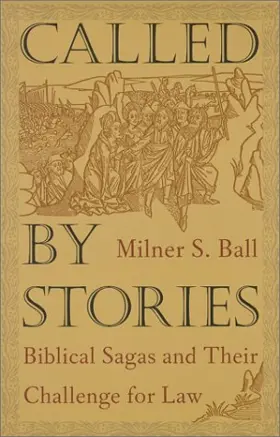

Called by Stories: Biblical Sagas and Their Challenge for Law
Pages
280
Publisher
Duke University Press
Published
6/1/2000
ISBN-13
9780822325246
Distinguished legal scholar and Presbyterian minister Milner S. Ball examines great sagas and tales from the Bible for the light they shed on the practice of law and on the meaning of a life lived in the legal profession. Scholars and laypersons alike typically think of the law as a discipline dominated by reason and empirical methods. Ball shows that many of the dilemmas and decisions that legal professionals confront are more usefully approached through an experience of narrative in which we come to know ourselves and our actions through stories.
He begins with the story of Moses, who is obliged both to speak for God to the Hebrews and to advocate for the Hebrews before God. What, asks Ball, does Moses’s predicament say to lawyers professionally bound to zealous representation of only one client? In the story of Rachel, Ball finds insights that comprehend the role of tears and emotion in the judicial process. He relates these insights to specific contemporary situations, such as a plant closing and the subsequent movement of jobs to Mexico and legal disputes over the sovereignty of native Hawaiians. In a discussion of “The Gospel According to John,” Ball points out that the writer of this gospel is free simultaneously to be critical of law and to rely extensively on it. Ball uses this narrative to explore the boundaries of free will and independence in lawyering. By venturing into the world of powerful events and biblical characters, Ball enables readers to contest their own expectations and fundamental assumptions.
Employing legal theory, theology, and literary criticism, Called by Stories distills a wisdom in biblical texts that speaks specifically to the working life of legal professionals. As such, it will enrich lovers of narrative and poetry, ethicists, literary and biblical scholars, theologians, lawyers, law students, judges, and others who seek to discern deeper meanings in the texts that have shaped their lives.
He begins with the story of Moses, who is obliged both to speak for God to the Hebrews and to advocate for the Hebrews before God. What, asks Ball, does Moses’s predicament say to lawyers professionally bound to zealous representation of only one client? In the story of Rachel, Ball finds insights that comprehend the role of tears and emotion in the judicial process. He relates these insights to specific contemporary situations, such as a plant closing and the subsequent movement of jobs to Mexico and legal disputes over the sovereignty of native Hawaiians. In a discussion of “The Gospel According to John,” Ball points out that the writer of this gospel is free simultaneously to be critical of law and to rely extensively on it. Ball uses this narrative to explore the boundaries of free will and independence in lawyering. By venturing into the world of powerful events and biblical characters, Ball enables readers to contest their own expectations and fundamental assumptions.
Employing legal theory, theology, and literary criticism, Called by Stories distills a wisdom in biblical texts that speaks specifically to the working life of legal professionals. As such, it will enrich lovers of narrative and poetry, ethicists, literary and biblical scholars, theologians, lawyers, law students, judges, and others who seek to discern deeper meanings in the texts that have shaped their lives.
Reviews
Called by Stories: Biblical Sagas and Their Challenge for Law Durham: Duke University Press, 2000. Pp. 272, Paperback, $17.95, ISBN 0822325241. Azila Talit Reisenberger University of Cape Town Cape Town, South Africa Milner S. Ball served as a judge on the International People’s Tribunal in Hawaii in 1993 and as a founder of the annual Robert Cover Public Interest Law Retreat. He is a member of the Theological Anthropology Project at the Center of Theological Inquiry at Princeton. He is the author of many books, including The Promise of American Law, Lying Down Together, and The Word and the Law. Currently, Ball is both Harmon W. Caldwell Professor of Constitutional Law at the University of Georgia School of Law and an ordained Presbyterian minister. This book is at the intersection of both of these interests, which are also his passions. Milner was impressed by Walter Brueggemann’s (Theology of the Old Testament, pp. xvi passim) proposal that the best way to convey the theological substance of the Hebrew Bible as a whole, is in the metaphor and imagery of courtroom trial. He suggests that there are further, critically important, specific associations with prophetic lawsuits. While he was engaged with students in a course, which examined the ethics, values and the legitimate guiding images for a person who is a lawyer, the seeds for this book were sown.
[Full Review]
